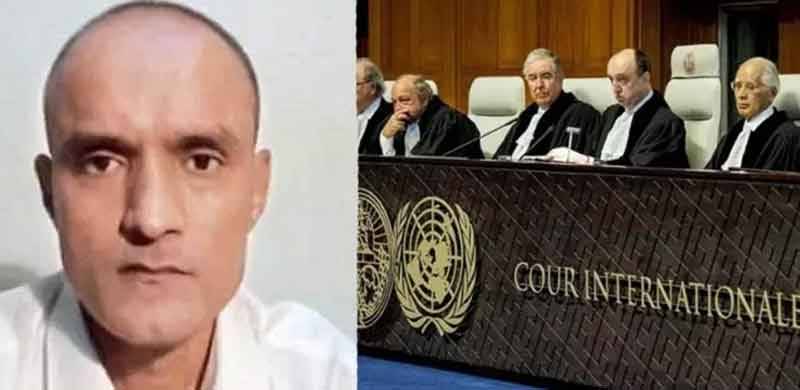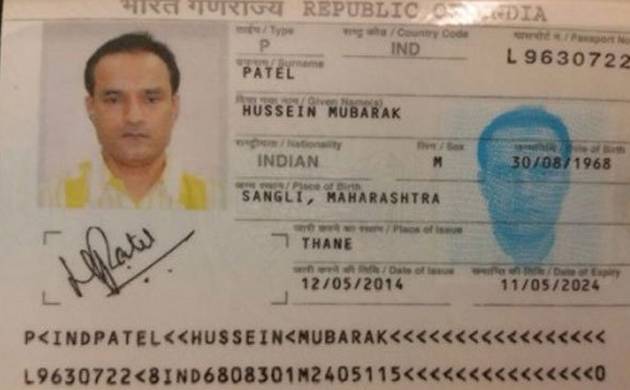
The passport is authentic. The name on the passport is Hussain Mubarak Patel. He was a frequent traveller from India to Iran. Sometimes he had some odd stop overs in UAE. He passed through Indian Immigration 17 times and no one in the security found anything odd. The passport contains various identity authentication elements. Presence of high quality cylinder mould watermark throughout the document, with random UV fluorescent fibres and high quality prints. The main portrait on the passport document is inkjet-printed and there was no evidence to support that this image had been manipulated. There is an additional ghost image which is made of personal data in a wave of pattern which adds further authenticity to the document. This is how Mr David Westgate summarised his expert opinion on the passport found on Commander Jhadav. He had his own picture on the front page of the passport, when he was caught spying by the Pakistani authorities in Balochistan.

The decision by the ICJ will be announced around 1730 PST and to this date, not even in the court has India raised any questions on the passport. The only thing they cry about is the consular access. Article 36 of the Vienna Convention on Consular Relations 1963 gives a right to every foreigner who is arrested or detained by the home state to have consular access. The law is not clear about the exceptions to this article, so customary international law is applied. However, when there is an existing treaty, the courts will have to prefer the treaty. India and Pakistan in 2008 signed a treaty where the exception to article 36 of the convention is mentioned stating that if it’s the issue of espionage or state security then the detained foreigner loses the right of consular access.
In short, India’s argument was that Commander Jhadav was kidnapped from Iran and that he was tortured to confess that he was an Indian Navy officer working for RAW. The conviction in Pakistan Military Court is not fair and is unacceptable. India wants the Acquittal, Release and Return!
Anything less than Acquittal, Release and Return is India’s defeat.
In response, Barrister Khawar Qureshi simply left India’s legal team speechless. Their body language was surely not a very hopeful one. Not to forget how the hearing started, when India’s lawyers refused to shake hands with Pakistan’s legal team.
The argument, obviously, mentioned the fact that Commander Jhadav’s passport was authentic and was provided by Indian authorities. He mentioned Pakistan and India’s 2008 agreement’s Article VI, where it was categorically decided that in the cases of national security, such as espionage, the consular access right will be decided on merits.
It is clear from the given facts that Commander Jhadav did everything with the approval of India’s government. 17 times he entered and exited New Delhi airport and not once was he stopped for the passport which was recovered from him when he was arrested. In ICJ, not once were these facts contested. The only argument raised was that the passport was forged, while David Westgate’s report says otherwise. The report of the expert has been fully owned by the author and he can easily be sued by India in England.
Anything that shows negligence on part of the expert can cost him his career and a huge financial penalty. But India has decided to completely ignore his assertions.
Lastly, Indian Judge Bhandari gave a press interview to the Indian Express Paper on 19th May 2017 which appeared to prejudge the merits of the hearing. It seems that no attempt was ever made by him to have the article removed as it is still online. This would be a damning evidence of bias for any court.
This is why the general perception in Pakistan is that we are losing the case. Most Pakistanis think that even the granting of the right of consular access is our defeat. This is because the way ICJ stayed the execution, it seemed they went overboard with their authority. Pakistani courts are known for easily giving stay on executions yet India decided not to avail the remedy.
It must be noted, our defeat will only be Jadhav's acquittal, release and return to India. Anything short of that is India’s defeat. If ICJ gives consular access to Jhadav, it will be a clear victory for Pakistan in the intense judicial and media war.
However, I don’t think ICJ can do much even if they wanted to. India has a remedy available in High Court and Supreme Court of Pakistan. ICJ is not a criminal court nor an appellate court. They cannot decide the merits of the case. We have seen how US refused to abide by ICJ’s decision in the past when it was in conflict with their domestic laws. So we believe that if ICJ crosses the jurisdictional limits then certainly Pakistan may follow in US's footsteps. This will surely undermine the ICJ, and why should anyone other than the ICJ get the blame for it?

The decision by the ICJ will be announced around 1730 PST and to this date, not even in the court has India raised any questions on the passport. The only thing they cry about is the consular access. Article 36 of the Vienna Convention on Consular Relations 1963 gives a right to every foreigner who is arrested or detained by the home state to have consular access. The law is not clear about the exceptions to this article, so customary international law is applied. However, when there is an existing treaty, the courts will have to prefer the treaty. India and Pakistan in 2008 signed a treaty where the exception to article 36 of the convention is mentioned stating that if it’s the issue of espionage or state security then the detained foreigner loses the right of consular access.
In short, India’s argument was that Commander Jhadav was kidnapped from Iran and that he was tortured to confess that he was an Indian Navy officer working for RAW. The conviction in Pakistan Military Court is not fair and is unacceptable. India wants the Acquittal, Release and Return!
Anything less than Acquittal, Release and Return is India’s defeat.
In response, Barrister Khawar Qureshi simply left India’s legal team speechless. Their body language was surely not a very hopeful one. Not to forget how the hearing started, when India’s lawyers refused to shake hands with Pakistan’s legal team.
The argument, obviously, mentioned the fact that Commander Jhadav’s passport was authentic and was provided by Indian authorities. He mentioned Pakistan and India’s 2008 agreement’s Article VI, where it was categorically decided that in the cases of national security, such as espionage, the consular access right will be decided on merits.
It is clear from the given facts that Commander Jhadav did everything with the approval of India’s government. 17 times he entered and exited New Delhi airport and not once was he stopped for the passport which was recovered from him when he was arrested. In ICJ, not once were these facts contested. The only argument raised was that the passport was forged, while David Westgate’s report says otherwise. The report of the expert has been fully owned by the author and he can easily be sued by India in England.
Anything that shows negligence on part of the expert can cost him his career and a huge financial penalty. But India has decided to completely ignore his assertions.
Lastly, Indian Judge Bhandari gave a press interview to the Indian Express Paper on 19th May 2017 which appeared to prejudge the merits of the hearing. It seems that no attempt was ever made by him to have the article removed as it is still online. This would be a damning evidence of bias for any court.
This is why the general perception in Pakistan is that we are losing the case. Most Pakistanis think that even the granting of the right of consular access is our defeat. This is because the way ICJ stayed the execution, it seemed they went overboard with their authority. Pakistani courts are known for easily giving stay on executions yet India decided not to avail the remedy.
It must be noted, our defeat will only be Jadhav's acquittal, release and return to India. Anything short of that is India’s defeat. If ICJ gives consular access to Jhadav, it will be a clear victory for Pakistan in the intense judicial and media war.
However, I don’t think ICJ can do much even if they wanted to. India has a remedy available in High Court and Supreme Court of Pakistan. ICJ is not a criminal court nor an appellate court. They cannot decide the merits of the case. We have seen how US refused to abide by ICJ’s decision in the past when it was in conflict with their domestic laws. So we believe that if ICJ crosses the jurisdictional limits then certainly Pakistan may follow in US's footsteps. This will surely undermine the ICJ, and why should anyone other than the ICJ get the blame for it?
